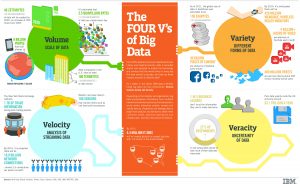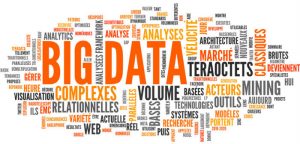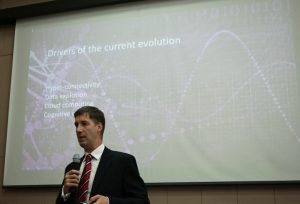On the occasion of World Telecommunication and Information Society Day, the National Computer Board organised a workshop focusing on Big Data, hosted by the Mauritian ICT Ministry. About 50 people working in the IT field came to learn about Big Data and expand their professional network.
In addition to the Minister of ICT, Mr. Yogida Sawminden, four major speakers were present on the day, they were:
- Andrew Quixley, sales lead for Watson, IBM’s Artificial Intelligence (AI) platform for the Middle East and Africa.
- Amrit Nawoor, Cloud Technology Manager for Oracle (SADC countries).
- Amit Juggurnath, Presales Senior Technology Consultant covering the Eastern Region and SADC.
- Ajmal Dookhan, director and project manager of software at Business Objectifs.
Big Data, or massive volumes of data
With the explosion in the number of mobile devices and digital services, the volume of data stored by information systems is growing exponentially. Every day we generate no less than 2.5 trillion bytes of data. So much so that 90% of the world’s data was created in the last two years alone. This creates huge databases that can no longer be stored by traditional IT. This is where big data came in, it’s about new infrastructures to manage these huge volumes of data.
“Information is the fuel of the 21st century and analytics is the combustion engine” Peter Sondergaard, Gartner Senior Vice President
This data comes from everywhere: from sensors used to collect weather information, from posts on social media sites, from digital images and videos posted online, from transactional records of online purchases, or from GPS signals from mobile phones.
4 key characteristics to qualify as a Big Data platform

@IBM
Big Data covers four dimensions (4V rule): Volume, Variety, Velocity and Veracity.
- Volume: the amount of data to be processed must be significant. This data can be counted in terabytes or even petabytes.
- Variety : Big Data comes from a variety of sources and in the form of structured or unstructured data.
- Velocity : a certain level of velocity and reactivity must be achieved in terms of data processing. There are many time-sensitive processes that require almost instantaneous information processing.
“53% of execs say critical information is delivered too late,” said Amrit Nawoor, Cloud Technology Manager for Oracle.
- Veracity : It is important to have reliable data. This is a major challenge for Big Data, and one that is made all the more difficult when the variety and number of data sources increase.
Growing demand for Big Data
Confronted very early on with these problems of mass data, the web giants such as Yahoo, Google and Facebook were pioneers in the field. However, for a few years now, Big Data has started to be used in other areas:
- Banks use it to spot fraud in real time,
- Telecoms to better exploit their customers’ data,
- The industrial sector uses it for predictive maintenance of equipment,
- In the health sector: for medical diagnostic assistance,
- In transport to optimize the flow of goods, etc.
From now on, with the help of analytical tools and the
modeling
data, companies and administrations can perform trend or predictive analysis, draw up profiles, anticipate risks and monitor phenomena in real time. Companies selling Big Data solutions are tapping into a burgeoning market, estimated to be worth tens of billions of dollars.
And yet, despite the growing demand for Big Data analytics, the workshop speakers all lamented the shortage of data scientists in the industry. This is, according to them, the major challenge of Big Data in our region.

Possible applications of Big Data in the region
Andrew Quixley concluded his presentation by talking to the audience about possible applications for Big Data. The result was :
- Chatboxes for customer service to provide 24/7 response. This would allow for automation in banks, for example.
- The diagnosis of diabetes. The Mauritian population is particularly affected by this disease, today it is possible to detect the presence or absence of the disease via an image of the patient’s retina.
- An effective solution to preserve the coral reef and marine life. Illegal fishing is a major economic and environmental challenge for the country. Big data could well be the solution. Using the data, authorities can monitor fishing activity on the coast. Thus, they are informed in real time of the number of boats, their location and their origin.

Andrew Quixley
The workshop concluded with a quick introduction to the Bluemix platform by all participants. They were asked to create a chatbot taking reservations for a restaurant.
Mauritius has a lot to gain from Big Data. The country could position itself as a talent pool, which would reduce the brain drain and increase private sector investment. However, to achieve this, the government has a critical role to play and must invest significantly in scientific training.




